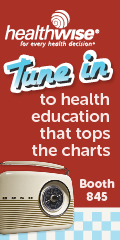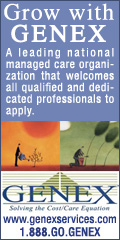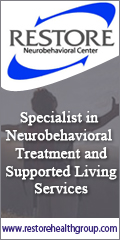
| Archives/Subscribe | Advertise | cmsa.org | cmsa.org | cmsatoday.org | August 2011 |
Study Examines Issue of Distance Caregiving By 2012, according to the article, an estimated 14 million people will serve as distance caregivers to family members who live across the state, across the region or even across the country. In "Lack of Communication and Control: Experience of Distance Caregivers of Patients," Polly Mazanec, PhD, ACNP, AOCN, FPCN, lead investigator on the study and an assistant professor at Case Western Reserve University's Frances Payne Bolton School of Nursing, and her fellow researchers discussed the need for a change in the way information is delivered to distance caregivers. Nurses can play a role in easing some of the emotional stress experienced by distant family members, the authors wrote: "The nurse is the health care team member most likely to have an impact on distance caregiver distress by providing education tools and support." The majority of the distance caregivers are secondary caregivers, Mazanec said, with local family members relaying patient information secondhand and often by phone. With sparse how-to information available to help these individuals, Mazanec first wanted to understand what bothered these caregivers and then develop an intervention to bring them into the loop of patient care. The study, part of a larger look at distance caregiving, involved telephone interviews with caregivers for patients with advanced lung, gastrointestinal and gynecologic malignancies. Each participant lived 100 miles or more from his/her family member and answered three open-ended questions that were taped and later transcribed. Common themes were a lack of control and information, but what emerged beyond those primary concerns were the following:
"Teaching distance caregivers about the disease process, treatment experience and side effects by providing information via telephone or computer may be an easy way to help caregivers gain control as they struggle to understand the cancer experience," the authors wrote. "Materials addressing chemotherapy or radiation therapy and websites with virtual tours could be developed so that distance caregivers could see where their loved ones were receiving treatment, decreasing uncertainty and increasing control. Written tips and information on high-quality resources (e.g. home care, meal delivery, and housekeeping) located in the patient's geographic community could provide the distance caregiver with tools for supporting their ill loved one." To listen to a podcast about the research, visit the Oncology Nursing Society website at: http://www.ons.org/Publications/ONF/Features/Podcast. Source: Nurse.com News http://news.nurse.com/apps/pbcs.dll/article?AID=2011108150021 |
|
| The leading membership association providing professional collaboration across the health care continuum. 6301 Ranch Drive | Little Rock, AR 72223 | Phone: (501) 225-2229 | Toll-Free: (800) 216-2672 | Fax:(501) 221-9608 Secure Fax Line for Credit Cards: (501) 421-2135 | Email: cmsa@cmsa.org | Website: www.cmsa.org |



